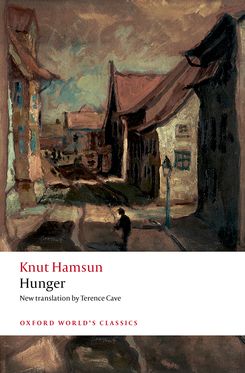Hamsun's Hunger

Hamsun's Hunger
|
ISBN: |
9780192862846 |
|
Binding: |
Paperback |
|
Published: |
26 Oct 2023 |
|
Availability: |
20
|
|
Series: |
$16.95 AUD
$18.99 NZD
Add To CartDescription
'It was at the time when I was wandering around hungry in Kristiania, that strange city no one leaves before it has set its mark on them...'
Hunger is the first-person story of a young man desperately trying to establish himself in the city as a writer, living in shabby lodgings where he can seldom afford to pay the rent, eating almost nothing, and engaging spasmodically and manically with landladies, eccentric elderly men, policemen, shopkeepers, pawnbrokers, and others on the way. He wanders around the streets, sits on benches trying to write, spends a night locked in a pitch-dark police cell, thinks, slides into remarkably inventive reveries, speculates on his mental health, his ethical comportment, his relation to the divinity, the topics he might write about. The traces of a consistent narrative logic are uncertain and blurred; the voice of the narrator keeps shifting between pragmatic appraisal of his situation, wild fantasies, manic outbursts, anger, and despair. This is a story that lies on the threshold of modernism, anticipating many of the dislocations that narrative will be subject to in the decades to come.
This new translation seeks to restore the startling freshness and epidermal unease of Hamsun's breakthrough story of 1890. It remains faithful to the style and voice of the text, the shifts of tense, the indirect free style, and the constant changes of register as the inner monologue moves between poetic sensitivity, wild fantasies, manic outbursts, and hyperbolic emotion. Tore Rem's introduction provides an updated and fresh account of the genesis of Hunger, its book history and its reception.
Find the eBook on VitalSource.
Features
- Provides a new perspective on the novel in the light of Hamsun's 'poetry of the nerves' by discussing not only the affective life of the narrator in this perspective but also the urban context which embodies his 'extended mind'
- The translation reflects new changes in scholarship and provides a fresh and sharp-edged sense of the narrative voice
- Pays specific attention to the relation between the segments of text that were published earlier and the novel as it appeared in 1890
ABOUT THE SERIES
For over 100 years Oxford World's Classics has made available the widest range of literature from around the globe. Each affordable volume reflects Oxford's commitment to scholarship, providing the most accurate text plus a wealth of other valuable features, including expert introductions by leading authorities, helpful notes to clarify the text, up-to-date bibliographies for further study, and much more.
Contents
Introduction
Note on the Translation
Select Bibliography
A Chronology of Knut Hamsun
Hunger
Explanatory Notes
Authors
Knut Hamsun
Translated by Terence Cave, Emeritus Professor of French Literature at the University of Oxford and Emeritus Fellow of St John's College, Oxford, and with introduction by Tore Rem, University of Oslo.
Tore Rem is Professor of Literatures in English at the University of Oslo and Director of the interdisciplinary initiative UiO:Democracy. He is an academic and a non-fiction writer and has published widely on Scandinavian and British literature. His Knut Hamsun: Reisen til Hitler ('The Journey to Hitler') came out in Norwegian in 2014 and has been translated into several languages. He is general editor of the Penguin Classics edition of Henrik Ibsen, and has, together with Narve Fulsås, published the monograph Ibsen, Scandinavia and the Making of a World Drama (2018) and edited Ibsen in Context (2021).
Terence Cave CBE FBA is Emeritus Professor of French Literature at the University of Oxford and Emeritus Fellow of St John's College, Oxford. Known primarily for his contributions to French Renaissance studies (The Cornucopian Text, 1979; Pré-histoires I and II, 1999 and 2001), he has also written on Aristotelian poetics (Recognitions, 1988) and on the relations between literature and music (Mignon's Afterlives, 2011). In 2009, he won the Balzan Prize for literature since 1500; he subsequently directed the Balzan project 'Literature as an object of knowledge', which explored cognitive approaches to literature. His books Thinking with Literature (2016), Reading Beyond the Code (jointly edited with Deirdre Wilson; 2018), and Live Artefacts (2022) are among the outcomes of this project. He has also translated Mme de Lafayette's The Princesse de Clèves for Oxford World's Classics.